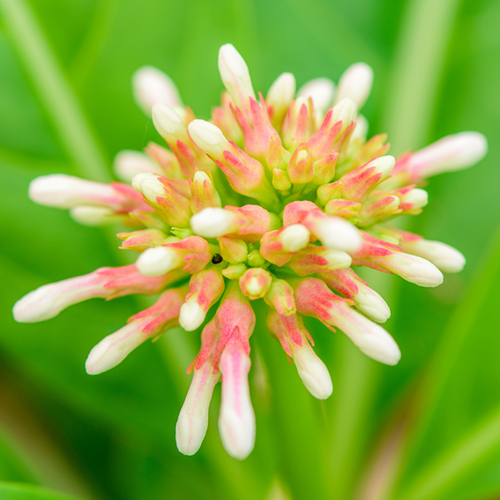
Background
Indian snakeroot contains small amounts of chemicals such as reserpine and yohimbine, which are prescription drugs that can cause serious side effects.
People use Indian snakeroot for high blood pressure, anxiety, constipation, malaria, insomnia, and many other conditions, but there is no good scientific evidence to support these uses.
Don't confuse Indian snakeroot with Rauvolfia vomitoria or Yohimbe. These are not the same.
Safety Safety definitions
Special Precautions & Warnings:
Pregnancy and breast-feeding: There isn't enough reliable information to know if Indian snakeroot is safe to use when pregnant or breast-feeding. Stay on the safe side and avoid use. The chemicals in Indian snakeroot can be passed to the unborn baby and into breast milk and might cause harm.Anxiety: Indian snakeroot contains a chemical that might make anxiety worse. Use Indian snakeroot with caution if you have anxiety.
Depression: Indian snakeroot can cause depression, especially in people who have had depression before.
Shock therapy (electroconvulsive therapy, ECT): Indian snakeroot should not be used by people who are receiving ECT. Stop taking Indian snakeroot at least one week before beginning ECT.
Gallbladder disease: Indian snakeroot might make gallbladder disease worse. Use Indian snakeroot with caution if you have gallbladder disease.
Heart disease: Chemicals in Indian snakeroot can increase or decrease blood pressure. Use with caution if you have heart disease or are at risk for heart disease.
Pheochromocytoma: Avoid Indian snakeroot if you have this condition. It might increase the risk of dangerously high blood pressure.
Gastrointestinal (GI) conditions: Indian snakeroot can irritate the stomach and intestines. Don't use it if you have ever had peptic ulcers or other stomach disorders.
Effectiveness
Dosing & administration
Interactions with pharmaceuticals
Digoxin (Lanoxin)
Interaction Rating=Major Do not take this combination.
Digoxin helps the heart beat more strongly. Indian snakeroot seems to slow the heartbeat. Taking Indian snakeroot along with digoxin might decrease the effects of digoxin. Do not take Indian snakeroot if you are taking digoxin.
Ephedrine
Interaction Rating=Moderate Be cautious with this combination.
Ephedrine can speed up the nervous system and make you feel jittery. Indian snakeroot might increase or decrease these effects from ephedrine.
Levodopa
Interaction Rating=Major Do not take this combination.
Levodopa is used for Parkinson disease. Taking Indian snakeroot along with levodopa might decrease the effects of levodopa. Do not take Indian snakeroot if you are taking levodopa.
Medications changed by the liver (Cytochrome P450 2D6 (CYP2D6) substrates)
Interaction Rating=Moderate Be cautious with this combination.
Some medications are changed and broken down by the liver. Indian snakeroot might change how quickly the liver breaks down these medications. This could change the effects and side effects of these medications.
Medications for depression (MAOIs)
Interaction Rating=Moderate Be cautious with this combination.
Indian snakeroot contains a chemical, called tyrosine, that affects the body. This chemical might increase the side effects of some medications used for depression.
Some common MAOIs include phenelzine (Nardil), selegiline (Zelapar), and tranylcypromine (Parnate).
Medications for depression (Tricyclic Antidepressants)
Interaction Rating=Moderate Be cautious with this combination.
Taking some medications used for depression might alter the effects of Indian snakeroot and increase the risk for side effects.
Medications for diabetes (Antidiabetes drugs)
Interaction Rating=Moderate Be cautious with this combination.
Indian snakeroot might lower blood sugar levels. Taking Indian snakeroot along with diabetes medications might cause blood sugar to drop too low. Monitor your blood sugar closely.
Medications for high blood pressure (Antihypertensive drugs)
Interaction Rating=Moderate Be cautious with this combination.
Indian snakeroot might lower blood pressure. Taking Indian snakeroot along with medications that lower blood pressure might cause blood pressure to go too low. Monitor your blood pressure closely.
Medications for high blood pressure (Beta-blockers)
Interaction Rating=Major Do not take this combination.
Indian snakeroot might lower blood pressure. Taking Indian snakeroot along with medications that lower blood pressure might cause blood pressure to go too low. Monitor your blood pressure closely.
Medications for mental conditions (Antipsychotic drugs)
Interaction Rating=Major Do not take this combination.
Taking Indian snakeroot along with some medications for mental conditions might increase the risk of side effects.
Medications that slow blood clotting (Anticoagulant / Antiplatelet drugs)
Interaction Rating=Moderate Be cautious with this combination.
Indian snakeroot might slow blood clotting. Taking Indian snakeroot along with medications that also slow blood clotting might increase the risk of bruising and bleeding.
Sedative medications (CNS Depressants)
Interaction Rating=Moderate Be cautious with this combination.
Indian snakeroot might cause sleepiness and slowed breathing. Some medications, called sedatives, can also cause sleepiness and slowed breathing. Taking Indian snakeroot with sedative medications might cause breathing problems and/or too much sleepiness.
Stimulant drugs
Interaction Rating=Moderate Be cautious with this combination.
Stimulants, such as amphetamines and cocaine, speed up the nervous system. By speeding up the nervous system, stimulant medications can increase blood pressure and speed up the heartbeat. Taking Indian snakeroot along with stimulant drugs might cause serious problems including increased heart rate and high blood pressure.
Interactions with herbs & supplements
Herbs and supplements that might lower blood sugar: Indian snakeroot might lower blood sugar. Taking it with other supplements with similar effects might lower blood sugar too much. Examples of supplements with this effect include aloe, bitter melon, cassia cinnamon, chromium, and prickly pear cactus.
Herbs and supplements that might slow blood clotting: Indian snakeroot might slow blood clotting and increase the risk of bleeding. Taking it with other supplements with similar effects might increase the risk of bleeding in some people. Examples of supplements with this effect include garlic, ginger, ginkgo, nattokinase, and Panax ginseng.
Herbs that contain cardiac glycosides: Indian snakeroot contains chemicals that can affect the heart. These chemicals are called cardiac glycosides. Using it along with other supplements that also contain cardiac glycosides can increase the risk of heart damage. Examples of supplements that contain cardiac glycosides include black hellebore, foxglove, lily-of-the-valley, oleander, and pleurisy root.




